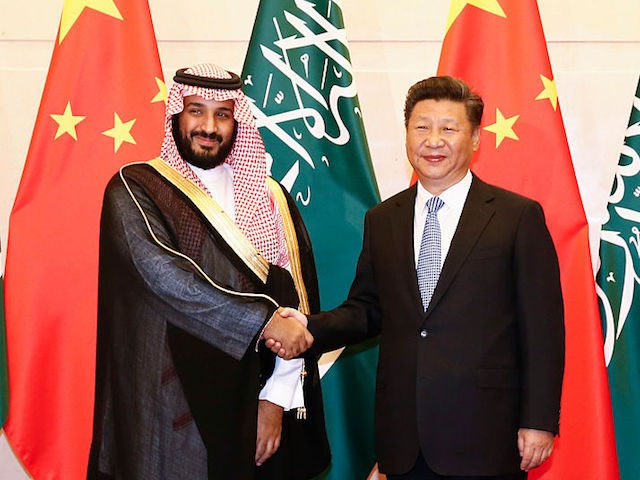Saudi Arabia and China both announced new bureaucratic mechanisms to monitor and confront “corruption” in their respective countries on Sunday.
The former debuted a field of special anti-corruption prosecutors who would dedicate themselves to targeting individuals who use their connections to swindle millions out of Saudi government coffers. The latter introduced a “National Supervisory Commission” more powerful than its Supreme Court that may soon have the power to prevent someone arrested arbitrarily from accessing an attorney.
The timing, and months of Chinese propaganda encouraging other nations to adopt the authoritarian policies of Xi Jinping’s Communist Party, raise concerns that a Saudi Arabia apparently looking to distance itself from violent Wahhabist Islam may adopt “socialism with Chinese characteristics” over more Western notions of secular democracy. Yet the Saudi government, in an effort spearheaded by Saudi Crown Prince Mohammed Bin Salman (known commonly as MBS), has made vocal efforts to expand ties to the United States and promote itself as a nation committed to modernizing reforms.
President Donald Trump will host MBS in Washington, DC, on March 20.
On Sunday, MBS’s father, King Salman, debuted the creation of an anti-corruption prosecution unit that would target potential graft nationally. Salman insisted the unit was necessary to “protect the homeland and its resources, maintain public money and protect the integrity of the public employment.” The nation’s Attorney General Sheikh Saud Bin Abdullah supported the move, noting that it was a legal delineation “within the framework of [Salman’s] concern to combat corruption in all its forms and with the aim of protecting the country and its resources.”
Sheikh Saud added that Salman was committed to “eradicate” corruption “from its roots with utmost force and transparency,” according to Saudi outlet Al Arabiya. Salman has made the arrest of suspected corrupt officials a hallmark of his tenure, targeting some of the wealthiest and most powerful members of the Saudi elite.
MBS currently controls a “supreme committee” against corruption that his father tasked him with. The National reports that the committee has identified over 200 people detained and questioned on suspicion of corruption including “high-ranking royals, former ministers and businessmen.” Most were detained at the Ritz-Carlton Riyadh in November, and released after handing over billions in reportedly stolen or laundered money to the government. Among those arrested were the son of Salman’s predecessor, King Abdullah, who was freed after settling with the government for $1 billion.
In late January, the government announced all those detained at the luxury hotel were no longer there and the government had retrieved $107 billion in lost funds. 95 of those released from the hotel remain in detention for largers crimes, but most settled to return the money they allegedly stole to the government. Saudi law enforcement published a detailed infographic breaking down where the money came from and how many of each crime they documented. Saudi law does not allow the publication of individuals’ names before they are convicted of a crime, leaving international outlets in the dark about who the purge targeted.
Despite the recovery of these funds allegedly stolen through bribes and money laundering – and assurances by the Saudi leadership that the money will go towards investing in the nation’s infrastructure and diversifying its oil-heavy economy – outlets like the New York Times have expressed concerns that a “large sector of Saudi Arabia’s movers and shakers are living in fear and uncertainty.”
The scope of this initial probe pales in comparison to China’s now-expected-to-be lifetime President Xi Jinping calling for thousands to be arrested for crimes as simple as spending too much money on a wedding. Following the three-month Saudi probe, MBS turned to investors and made the case that the landscape in Saudi Arabia is now much safer for their money, the nation’s most brazen fiscal criminals now rendered inoperative. Xi’s campaign is currently entering its fourth year.
The latest Chinese move hit the news the same day as the Saudi special units for corruption made their debut. Beijing announced the creation of a “National Supervisory Commission,” more powerful than the nation’s supreme court, that would have oversight over every single member of the Chinese public. The commission would replace the Central Commission for Discipline Inspection (CCDI), which only had jurisdiction over Communist Party members and nonetheless arrested thousands of individuals suspected of anti-socialist corruption activity, including “hedonism and extravagance.”
The South China Morning Post reported Tuesday that the National Supervisory Commission would have the power to investigate, detain, and interrogate individuals without consulting with police agencies. The orders could come directly from Beijing—directly from Xi—against anyone it chooses.
When Beijing first announced that it began the creation of the committee in November, the state media outlet Xinhua reported, “All provinces, regions and cities must closely connect regional practices, integrate reform pilot scheme experience, implement the overall plan according to the decision of the party’s Central Committee, and promote organizational integration.”
The Saudi anti-corruption push has targeted only the nation’s most privileged so far, and only those, the government says, suspected of stealing government money necessary for the modernization of Saudi Arabia. MBS has yet to make any mention of “hedonism and extravagance”—on the contrary, he has made clear his desire to move the country away, at least in part, from strict Sharia law and allow a more “moderate Islam that is open to the world” to flourish.
Yet a move towards secularism does not guarantee a move towards democracy, and the framework of the Saudi project unsettlingly resembles a less totalitarian version of the Chinese anti-corruption commission. When he meets with MBS next week, President Trump must keep in mind that his is not the only country bidding to be Saudi Arabia’s secular role model.

COMMENTS
Please let us know if you're having issues with commenting.